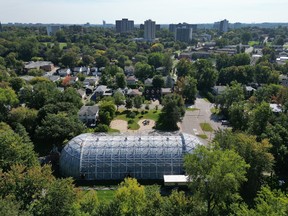Business
Ottawa Mayor Proposes Budget Amid $10.2 Billion Infrastructure Shortfall

Mayor Mark Sutcliffe has unveiled his proposed budget directions for the City of Ottawa, emphasizing a need for a 3.75 percent increase in overall property taxes. This increase aims to support essential services for the city’s residents while assembling a total budget of $5 billion for the year 2026. The city’s finance and economic development committee will address these proposed directions on September 2, 2023, followed by public consultations and the formal draft budget slated for November. A final decision regarding service levels, taxes, and fees will occur in December, marking the last budget from this city council before the upcoming municipal elections.
While the budget proposal outlines necessary funding to maintain services, it notably lacks a plan to address the city’s deteriorating infrastructure. This is a pressing concern, as the City Council recently received a comprehensive report detailing the state of various public assets through 10 Asset Management Plans. The findings revealed a staggering funding shortfall of $10.2 billion over the next decade needed to maintain and replace aging facilities and equipment.
The average age of Ottawa’s arenas and rinks is approximately 45 years, while aquatic facilities average 40 years. Community assets, which include community centres and fieldhouses, are around 39 years old. Cultural assets, by contrast, are aging even more dramatically, with an average age of 62 years. Alarmingly, reports indicate that 34 arenas and ice pads—about 14 percent—are in poor or very poor condition, along with 172 community assets and 22 cultural assets, both at 17 percent and 22 percent respectively.
Despite efforts to allocate funding for the maintenance and enhancement of recreational and cultural facilities, the Recreation and Cultural Services Asset Management Plan reveals an annual shortfall averaging $87.5 million. This gap underscores the reality that the city is not investing sufficiently to keep its public assets in good repair.
The current budget directions do not address these critical issues, setting the stage for a significant challenge ahead. The expectation is that a funding plan to address the infrastructure shortfall will be presented in 2028, three years after the problem was identified. In the interim, Ottawa’s facilities continue to age, with extended closures for repairs exacerbating the situation.
Addressing the maintenance and investment needs of the city’s public assets is urgent. As the budget discussions move forward, city council faces mounting pressure to confront these infrastructure challenges head-on. It would be a dereliction of duty to avoid such responsibility, and the 2026 budget presents an essential opportunity to make meaningful progress in this area. Alex Cullen, a former city councillor from 2000 to 2010, emphasizes the necessity of prioritizing infrastructure investment to meet the expectations of Ottawa’s residents.
-

 Education4 months ago
Education4 months agoBrandon University’s Failed $5 Million Project Sparks Oversight Review
-

 Science5 months ago
Science5 months agoMicrosoft Confirms U.S. Law Overrules Canadian Data Sovereignty
-

 Lifestyle5 months ago
Lifestyle5 months agoWinnipeg Celebrates Culinary Creativity During Le Burger Week 2025
-

 Health5 months ago
Health5 months agoMontreal’s Groupe Marcelle Leads Canadian Cosmetic Industry Growth
-

 Science5 months ago
Science5 months agoTech Innovator Amandipp Singh Transforms Hiring for Disabled
-

 Technology5 months ago
Technology5 months agoDragon Ball: Sparking! Zero Launching on Switch and Switch 2 This November
-

 Education5 months ago
Education5 months agoNew SĆIȺNEW̱ SṮEȽIṮḴEȽ Elementary Opens in Langford for 2025/2026 Year
-

 Education5 months ago
Education5 months agoRed River College Launches New Programs to Address Industry Needs
-

 Business4 months ago
Business4 months agoRocket Lab Reports Strong Q2 2025 Revenue Growth and Future Plans
-

 Technology5 months ago
Technology5 months agoGoogle Pixel 10 Pro Fold Specs Unveiled Ahead of Launch
-

 Top Stories1 month ago
Top Stories1 month agoCanadiens Eye Elias Pettersson: What It Would Cost to Acquire Him
-

 Technology3 months ago
Technology3 months agoDiscord Faces Serious Security Breach Affecting Millions
-

 Education5 months ago
Education5 months agoAlberta Teachers’ Strike: Potential Impacts on Students and Families
-

 Business1 month ago
Business1 month agoEngineAI Unveils T800 Humanoid Robot, Setting New Industry Standards
-

 Business5 months ago
Business5 months agoBNA Brewing to Open New Bowling Alley in Downtown Penticton
-

 Science5 months ago
Science5 months agoChina’s Wukong Spacesuit Sets New Standard for AI in Space
-

 Lifestyle3 months ago
Lifestyle3 months agoCanadian Author Secures Funding to Write Book Without Financial Strain
-

 Business5 months ago
Business5 months agoNew Estimates Reveal ChatGPT-5 Energy Use Could Soar
-

 Business3 months ago
Business3 months agoHydro-Québec Espionage Trial Exposes Internal Oversight Failures
-

 Business5 months ago
Business5 months agoDawson City Residents Rally Around Buy Canadian Movement
-

 Technology5 months ago
Technology5 months agoFuture Entertainment Launches DDoD with Gameplay Trailer Showcase
-

 Top Stories4 months ago
Top Stories4 months agoBlue Jays Shift José Berríos to Bullpen Ahead of Playoffs
-

 Technology5 months ago
Technology5 months agoWorld of Warcraft Players Buzz Over 19-Quest Bee Challenge
-

 Top Stories3 months ago
Top Stories3 months agoPatrik Laine Struggles to Make Impact for Canadiens Early Season










